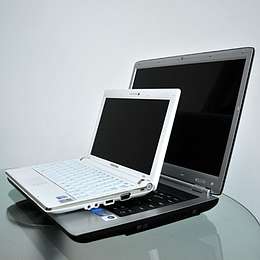 Netbooks have become one of the largest sectors of the hardware market since Asus introduced the Eee PC in late 2007. Asus has enjoyed phenomenal success with their netbook range and the early models sold out instantly (I tried to buy one without success). Every major PC manufacturer now produces a netbook and the market continues to expand.
Netbooks typically use slower hardware and older software, which makes them ideal for children or those with more modest computing requirements. However, thay can also provide web developers and freelancers with an ideal accompliment to their existing PC setup.
1. Portability
Like many people, I use a full-sized laptop for my primary development tasks. However, I have so many accessories attached, that it might as well be a desktop PC. If I want to move the machine, I need to unplug a second monitor, external harddisk, keyboard, mouse, and various cables. Even when that’s done, the machine remains too heavy to carry for long periods.
I now take a netbook when visiting client sites. It has all my essential software and can be plugged into projectors or monitors just like a normal laptop. There’s no need to disassemble my office hardware and the device can be carried all day without causing a hernia.
2. Communication and quick tasks
Netbooks are great for checking email, running Skype, or performing quick tasks. Most netbooks are wifi-enabled and are provided with a fast OS such as Windows XP or an optimized version of Linux. The devices can be started up, used, and shut down quicker than most Vista laptops take to boot.
Incidentally, do not be afraid to buy a Linux-powered netbook. Once you are over the initial “it’s not Windows” shock, you will find Linux to be a highly-capable and usable OS which can run Windows software if you install Wine. Even if you do not like the OS supplied, you can download and install an alternative such as the excellent Ubuntu Netbook Remix.
3. Working on the move
Mobile phones and Blackberry devices are useful, but the small screen, tiny keyboard, and limited software makes it difficult to do real work. The majority of netbooks are powerful enough to run software such as Apache, PHP, MySQL, OpenOffice, and a simple IDE or editor such as Notepad++. I even know of people who run Photoshop (although it was more to prove a point rather than do design work!)
4. Photography
The majority of netbooks have built-in memory card readers. This makes it easy to take a netbook to a shoot, copy/backup files, and examine photographs on a larger screen. Most netbooks have webcams, so it’s even possible to take a few shots without a camera.
5. Backup and synchronization
A netbook provides you with another computing device in the event of your main PC failing. That happened to me a few months ago, but I was able to carry on working.
Software such as Dropbox is also invaluable for backing up and synchronizing files between all your PCs.
6. Price
The first Asus Eee PC was a fifth of the price of similarly-sized machines. Although the hardware specifications and prices have increased, it is still possible to buy a netbook for $200: far less than a decent mobile phone. You could even use one as an alternative to a Kindle!
Replacing a netbook will not cause significant cash-flow problems, so you will not be as afraid to lose or break the device.
This blog post was written and posted using a MSI Wind U100.
Do you use a netbook or are you considering one? Do you find it useful? Have you experienced other benefits?
Netbooks have become one of the largest sectors of the hardware market since Asus introduced the Eee PC in late 2007. Asus has enjoyed phenomenal success with their netbook range and the early models sold out instantly (I tried to buy one without success). Every major PC manufacturer now produces a netbook and the market continues to expand.
Netbooks typically use slower hardware and older software, which makes them ideal for children or those with more modest computing requirements. However, thay can also provide web developers and freelancers with an ideal accompliment to their existing PC setup.
1. Portability
Like many people, I use a full-sized laptop for my primary development tasks. However, I have so many accessories attached, that it might as well be a desktop PC. If I want to move the machine, I need to unplug a second monitor, external harddisk, keyboard, mouse, and various cables. Even when that’s done, the machine remains too heavy to carry for long periods.
I now take a netbook when visiting client sites. It has all my essential software and can be plugged into projectors or monitors just like a normal laptop. There’s no need to disassemble my office hardware and the device can be carried all day without causing a hernia.
2. Communication and quick tasks
Netbooks are great for checking email, running Skype, or performing quick tasks. Most netbooks are wifi-enabled and are provided with a fast OS such as Windows XP or an optimized version of Linux. The devices can be started up, used, and shut down quicker than most Vista laptops take to boot.
Incidentally, do not be afraid to buy a Linux-powered netbook. Once you are over the initial “it’s not Windows” shock, you will find Linux to be a highly-capable and usable OS which can run Windows software if you install Wine. Even if you do not like the OS supplied, you can download and install an alternative such as the excellent Ubuntu Netbook Remix.
3. Working on the move
Mobile phones and Blackberry devices are useful, but the small screen, tiny keyboard, and limited software makes it difficult to do real work. The majority of netbooks are powerful enough to run software such as Apache, PHP, MySQL, OpenOffice, and a simple IDE or editor such as Notepad++. I even know of people who run Photoshop (although it was more to prove a point rather than do design work!)
4. Photography
The majority of netbooks have built-in memory card readers. This makes it easy to take a netbook to a shoot, copy/backup files, and examine photographs on a larger screen. Most netbooks have webcams, so it’s even possible to take a few shots without a camera.
5. Backup and synchronization
A netbook provides you with another computing device in the event of your main PC failing. That happened to me a few months ago, but I was able to carry on working.
Software such as Dropbox is also invaluable for backing up and synchronizing files between all your PCs.
6. Price
The first Asus Eee PC was a fifth of the price of similarly-sized machines. Although the hardware specifications and prices have increased, it is still possible to buy a netbook for $200: far less than a decent mobile phone. You could even use one as an alternative to a Kindle!
Replacing a netbook will not cause significant cash-flow problems, so you will not be as afraid to lose or break the device.
This blog post was written and posted using a MSI Wind U100.
Do you use a netbook or are you considering one? Do you find it useful? Have you experienced other benefits?
Frequently Asked Questions (FAQs) About Netbooks
What are the key differences between a netbook and a laptop?
Netbooks and laptops may seem similar, but they have distinct differences. Netbooks are smaller, lighter, and less powerful than laptops. They are designed for basic tasks such as web browsing, email, and word processing. Laptops, on the other hand, are more powerful and versatile, capable of handling more demanding tasks like video editing and gaming. However, they are also heavier and more expensive.
Can I use a netbook for gaming?
Netbooks are not designed for heavy gaming. Their smaller size and less powerful hardware make them unsuitable for running high-end games. However, they can handle casual or older games that don’t require much processing power.
What are the advantages of a netbook over a tablet?
Netbooks offer several advantages over tablets. They have a physical keyboard, which many people find easier to type on than a touchscreen. They also run a full operating system, allowing you to use the same software you would on a desktop or laptop. Additionally, they often have more storage space and ports for connecting peripherals.
How portable is a netbook?
Netbooks are extremely portable. They are smaller and lighter than most laptops, making them easy to carry in a bag or backpack. This makes them ideal for travel or for people who need a computer on the go.
Can I upgrade the hardware in my netbook?
Upgrading the hardware in a netbook can be challenging. Due to their compact size, many components are integrated directly into the motherboard, making them difficult to replace. However, some models may allow you to upgrade the RAM or hard drive.
How long does the battery life of a netbook last?
The battery life of a netbook can vary depending on the model and how you use it. However, many netbooks are designed to be energy efficient and can last for several hours on a single charge.
Can I run office applications on a netbook?
Yes, you can run office applications on a netbook. They are capable of running software like Microsoft Office or Google Docs, making them suitable for word processing, spreadsheets, and presentations.
Is a netbook suitable for students?
Netbooks can be a good choice for students. They are portable, affordable, and capable of handling basic tasks like note-taking, web browsing, and email. However, they may not be suitable for more demanding tasks like video editing or 3D modeling.
Can I watch movies and videos on a netbook?
Yes, you can watch movies and videos on a netbook. While their screens are smaller than those of laptops, they are still capable of playing video content. However, the quality may not be as high as on a larger, more powerful device.
What operating systems can run on a netbook?
Most netbooks run Windows, but some models can also run Linux. The choice of operating system can affect the performance and functionality of the netbook, so it’s important to choose one that suits your needs.
Craig is a freelance UK web consultant who built his first page for IE2.0 in 1995. Since that time he's been advocating standards, accessibility, and best-practice HTML5 techniques. He's created enterprise specifications, websites and online applications for companies and organisations including the UK Parliament, the European Parliament, the Department of Energy & Climate Change, Microsoft, and more. He's written more than 1,000 articles for SitePoint and you can find him @craigbuckler.


